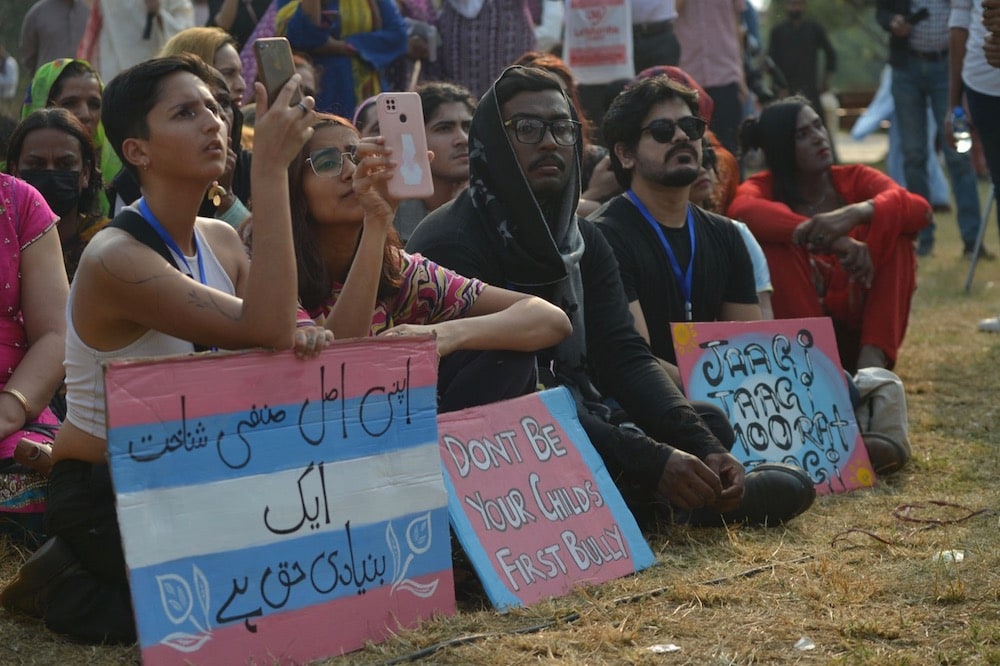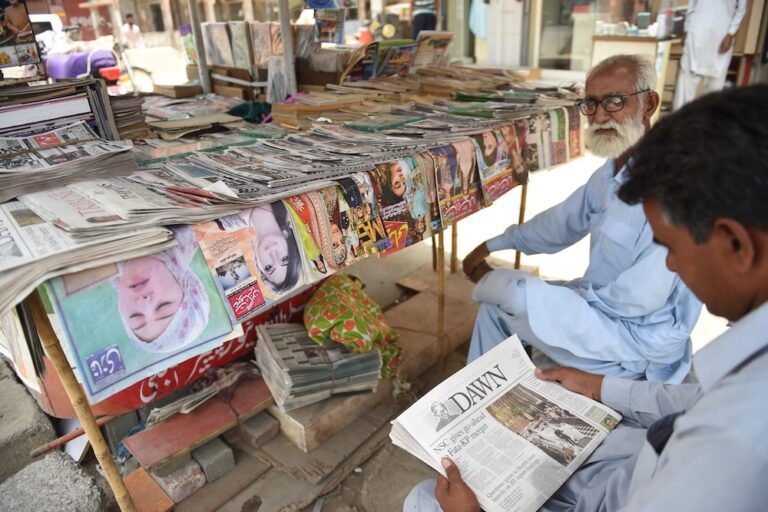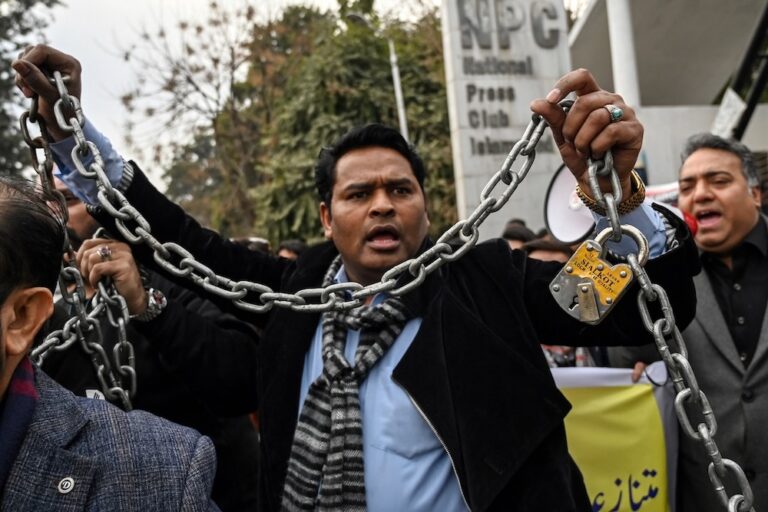Social media platforms have been weaponized to spread hate against minorities and trans people.
This statement was originally published on digitalrightsmonitor.pk on 14 March 2023.
Introduction
Shahzadi Rai has lived in Karachi most of her life and is a trans rights activist working in various communities in the city. She is also a trans woman vocal on social media, especially Twitter. Rai tweets about trans rights but also uses the social media platforms to talk about other human rights issues in the country. Recently, she decided to step away from the platform.
“I used to be really active and would argue with people but now I’ve been advised to take a step back,” she says during our conversation. A few months ago, things changed for Rai. She had joined Twitter because she thought it was a platform to engage with educated people on issues. It became everything but that for her.
Target: Transgender Act
Prominent religious political parties, the Jamaat-e-Islami (JI) and the Jamiat Ulema-e-Islam-Fazl (JUI-F) started a campaign to amend Pakistan’s trans rights bill. The JUI-F petitioned the Federal Shariat Court, asking them to declare Pakistan’s Transgender Act as being against Shariah while JI Senator Mushtaq Ahmad presented a bill in the Senate asking them to amend the act.
The issue at the heart of the matter seemed to be to create a qualification for people who wish to identify as trans and to drop the using the word ‘trans’ altogether and instead use the term ‘intersex’ to refer to the trans community. It played to the ignorance of transgender people, perpetuating harmful stereotypes in a country like Pakistan by equating trans persons with homosexuality.
As part of this they targeted prominent trans activists online and created misinformation about what it means to be trans. They especially targeted activists who were outspoken and unapologetic like Rai and Mehrub Moiz Awan. There were hashtags specifically targeting them with their deadnames, misgendering them and using their images before they transitioned to spin the narrative that they were actually men.
“Looking at the images was traumatic,” says Rai. She says that on other platforms like Instagram and Facebook, she is able to delete hateful comments from underneath her own posts at least, but Twitter doesn’t allow that. “They were just there and I had to keep looking at those images,” she says.
As a vocal, prominent trans woman in Pakistan, Rai’s life was never simple or without danger. She has a family that has disowned her and belongs to a community which has constantly had to face violence and prejudice. But the online campaign penetrated the safe bubble she had worked hard to create around herself.
“Some people, who I know for sure are from the JUI, sent a bunch of teenage boys to my house to talk to me,” she says, adding, “I call them kids because two of those boys I knew who they were.” According to Rai, the first time they came to her house they were respectful and came during the afternoon and asked to speak to her. She refused to speak to them because she had already been advised by her peers not to engage with them. There was fear within the trans community that the conversation might take a religious tone and escalate into violence.
The second time, Shahazadi says, “they showed up in the night, around 10:30pm, I think and were more aggressive in their tone. This time I felt threatened in my own space and so I knew I had to defend myself.” Rai says she took a stick, brandished it at them, and yelled at them to leave. They left then but the incident shook her. “I own this house, this is like a dera for our community,” she says. She is aware though that she got lucky, “People in my locality also sided with me so the matter was sorted.”
The harassment did not end here. Banners sponsored by the JUI against the transgender act were put up in the park where she went to walk every day. “They would try to engage with me there as well, but I refused,” she says. Rai says this physical harassment came after the online campaign.
She says online hate and offline harassment feed into each other, giving strength to bigots in the real world. Rai points to the YouTube channel of Raja Zia ul Haq, who regularly spews hate against the trans community in Pakistan. His YouTube channel has 550k followers and his Twitter account has over 22,000 followers. She says the attacks in online spaces feel coordinated, where there is an army of fake accounts, spewing hate at them and they can’t keep track of all the accounts.
Mehrub Moiz
Mehrub Moiz Awan is often on the receiving end of a lot of hate on social media platforms. There were multiple hashtags, using her dead name, directly targeting her during the JUI’s campaign to amend the transgender bill. The harassment was similar to what Rai had faced — pre-transition images being shared, personal images put online, trying to access their families to get more information on them in person.
Mehrub has had a very public transition – “Not by choice,” she says. A few years ago, she was transitioning but away from the public eye. Then at an event with other members of the trans community, she was attacked — something she spoke about publicly. “At the time I got a lot of sympathy,” she says, but like other trans women it also made her more vulnerable to similar attacks. “It was my first direct exposure of misogyny and being attacked by troll farms,” she said. At the time she said had to block hundreds of accounts.
One of the points of attack towards Mehrub seems to be her comedy. The genre would be adult humour and she doesn’t shy away from conversations about sex and gender, weaving her own transition into the narrative. In her opinion she is opening up a conversation about these issues.
At one of her shows in Lahore in the midst of the campaign against her and the trans rights bill, she invited the audience to ask any questions they might have about who she is, and the trans community —as crassly or as politely as they might want to. In a small hall, with a paid ticket her audience seemed like an echo chamber. This was not Twitter, where she was open to the organized campaign of misinformation and hate against her and the trans community. No one here was going to take snippets of her videos and slut shame her for her jokes.
In some ways, Mehrub has seen a loss of privilege in society and in the type of comments she sees on social media. Almost six years ago when she started posting online as a female character Shumaila Bhatti on Facebook, using Snapchat filters to alter her appearance, she still presented as a man outside of the character. The response though to someone who appears to be a man mimicking a woman and someone who openly speaks about being khawaja sira has been different.
Her public presence, her openness and willingness to engage with everyone from religious scholars in television shows to a private audience in a small hall have not shielded her from the consequences of outright transphobia and misogyny. Mehrub, a Fulbright scholar with a Masters in Public Health, an MBBS doctor has not been able to find a job. What started as a campaign by a leading designer in the country, to have Mehrub banned from speaking at her children’s school, has become much more for Mehrub.
“They can clean up their image now,” she says, referring to the school that canceled her talk, “but for me it does not end here.” The past few months she has interviewed for multiple positions, one organization also reached out to her offering her a job but they didn’t seem to know that she had transitioned. “When an employer Googles me, this is amongst the first things that show up,” she says talking about the hashtags and propaganda against her.
Campaigns of misinformation
At a personal level Rai can put away her phone or choose not to respond to some people on Twitter but it does not undo the very organized campaigns of misinformation or hate against the trans community. An analysis of some of the more prominent hashtags using InVid’s Twitter Analysis Tool shows that there were over 7,000 tweets associated with the campaign against the trans community generated by a handful of accounts but which were amplified through retweets and likes. The 7,195 original tweets were retweeted over 88 thousand times and received over a hundred thousand likes.
The analysis shows an obvious link with the JUI and JI since the campaign to amend the bill was a direct result of JI Senator Mushtaq Ahmad asking to amend the bill at the senate. A cluster analysis of communities shows how the senator and the accounts related to him were at the centre of the campaign. However, the analysis also shows that the accounts targeting Mehrub were also using the same hashtags as the JUI campaign. There is also a clear pattern on the type of content that these accounts seem to push out — right-wing religious narratives. Some are also really obviously bot accounts. Accounts that have been set up recently do nothing but amplify some of the content and hashtags that is being pushed out by other accounts by retweeting it almost constantly.
The community analysis of multiple hashtags shows that at the centre of this is the senator as you move towards the periphery there are also overlaps with accounts and hashtags used to support the narrative of Pakistan Tehreek-e-Insaf. One such hashtag is Imported Hakoomat Na Manzoor. Some of the accounts also have either the PTI’s poster or Imran Khan’s photos as their profile pictures.
Despite amplification by what seem to be bot accounts, the active hate against the trans community, and specifically the targeting of vocal and prominent trans women in online spaces, there are also very real people who were fueling the fire, which adds to the fear within the community that the online threats could very easily turn to physical threats, given the kind of threats the trans community already faces within the country.
Twitter, Insta and hate speech
Twitter also has some very clear rules about hate speech online — some of these hashtags would qualify under those but they continue. Some of the main accounts, which put out the most number of tweets, are still active on Twitter. They have not been shut down. Hyra Basit, program manager at the Digital Rights Foundation’s cyber harassment helpline, who helped escalate some of these instances to Twitter and other social media platforms, working closely with the trans community, says that the onus of getting this material removed lies largely on the person — despite written policies.
“We help Twitter by escalating the issue with them and flagging some of the tweets and accounts and also give them some local context of why it is serious,” she says, adding that they do take the flagged content down. However, for Basit what seems to be a larger problem is controlling content across platforms. “A screenshot of a tweet is taken and posted on Insta so even if you get it removed from Twitter, it’s still on Insta,” she says.
In a similar way, a lot of the images and videos of trans women shared during the campaign seemed to be coming from Instagram. An entire account still exists on the platform with Rai’s images pre-transition and another one that has images and videos of Mehrub that were also shared on Twitter. Basit says that Meta, the company that owns both Instagram and Facebook, has always been slow to act. She says once an issue is escalated to Twitter, they are faster to react and have managed to get content down during a time when the company itself was a mess after Musk’s takeover.
Despite this, though, accounts which propagate misinformation and hate speech continue to function. An account that featured prominently in the campaign to amend the transgender bill also seems to be impersonating anchorperson Imran Riaz Khan. The account has 245.6k followers and despite Twitter’s own rules about impersonation does not clearly state whether it is a fan account or a parody account.
On Insta too hate accounts, with names specifically targeting individuals, continue to exist. One particular account has images targeting multiple well known trans women, using images before their transition in an attempt to show that they aren’t men. These same images and videos have been shared on Twitter. At the same time prominent YouTube vloggers, some of them with substantial followings on Twitter as well featured within these campaigns. One such page is Shaoor pk, a link from their video on YouTube was shared during the Twitter hate campaign as well. The website shows that the page regularly publishes content against feminism and women rights in the country as well.
These claims of trans individuals being trolled by prominent members, that then drive their followers to a particular trans person’s account, leading to more harassment aren’t unheard of on Twitter. A study by Ditch The Label, a nonprofit working to help young people, and its analytics partner Brandwatch found that 12 per cent of all conversation on social media platforms in the US and UK about the trans community was hate in various forms. This spiked around important political events or policy decisions but the interactions overwhelmingly on these platforms for the trans community were negative.
Twitter terms of service
As a result of similar studies and constant criticism by trans activists Twitter particularly updated its terms of service to state in 2018, “We prohibit targeting individuals with repeated slurs, tropes or other content that intends to dehumanize, degrade or reinforce negative or harmful stereotypes about a protected category. This includes targeted misgendering or deadnaming of transgender individuals.” However, more recently, with Elon Musk’s takeover of the platform a lot of these rules were overturned in the name of free speech. He restored accounts that had been previously suspended for harassing transgender people.
Basit says that a lot of their interaction with Twitter and other social media platforms when flagging hate speech and threats involves explaining local context to them and how real the threat is to the individuals being targeted. She says at times they also get in touch with them to identify key events in advance so that they know to look out for a particular type of hate speech.
A lot of the hashtags are in Urdu — and language has always been a blind spot. Rai recognizes this too. But more than social media platforms, she feels that the government also needs to do more to curtail hate speech. In both cases, Awan and Rai did not feel safe involving authorities, especially with online hate speech. They don’t feel safe approaching law-enforcement agencies for protection.
“I’ve had to go into therapy because I really did not know how to deal with the hate coming my way and am learning to put my phone away more often and not engage with everyone,” says Shahzadi. She is also more afraid to go into the communities she works in. She’d worked in Lyari previously but for the first time in her life she was afraid of going there. “Before I used to feel comfortable taking a bike from one place or another or a rickshaw but now I use a car,” she says, adding more quietly: “I now wear a mask to hide my face.”
On the other hand, Mehrub is for the first time in years thinking of leaving the country. “When my family used to tell me before leaving, I told them I didn’t want to but now I am thinking about it”, she says – far from the unapologetic person we’ve seen on Twitter.



